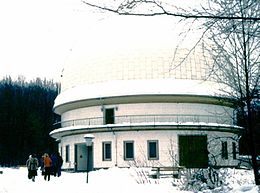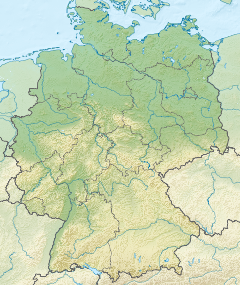| This article needs additional citations for verification. Please help improve this article by adding citations to reliable sources. Unsourced material may be challenged and removed. Find sources: "Karl Schwarzschild Observatory" – news · newspapers · books · scholar · JSTOR (January 2015) (Learn how and when to remove this message) |
 Karl Schwarzschild Observatory in 1981 Karl Schwarzschild Observatory in 1981 | |||
| Alternative names | Thüringer Landessternwarte Tautenburg | ||
|---|---|---|---|
| Named after | Karl Schwarzschild | ||
| Organization | Thuringian State Observatory | ||
| Observatory code | 033 | ||
| Location | Tautenburg, Thuringia | ||
| Coordinates | 50°58′48.4″N 11°42′40.2″E / 50.980111°N 11.711167°E / 50.980111; 11.711167 | ||
| Altitude | 341 m (1,119 ft) | ||
| Established | 1960 (1960) | ||
| Website | www | ||
| Telescopes | |||
| |||
 | |||
| | |||
| [edit on Wikidata] | |||
The Karl Schwarzschild Observatory (German: Karl-Schwarzschild-Observatorium) is a German astronomical observatory in Tautenburg near Jena, Thuringia.
It was founded in 1960 as an affiliated institute of the former German Academy of Sciences at Berlin and named in honour of the astronomer and physicist Karl Schwarzschild (1873–1916). In 1992, the institute was re-established as Thuringian State Observatory (Thüringer Landessternwarte, TLS).

The observatory has the largest telescope located in Germany, which is also the largest Schmidt camera in the world. Made by VEB Zeiss Jena (the branch of Carl Zeiss located in Jena in what was then East Germany), this instrument is known as (2m) Alfred Jensch Telescope: though its mirror is 2 metres in diameter, the telescope's aperture is 1.34 m.
The observatory has observed several exoplanets and brown dwarfs, as around the stars HD 8673, 30 Arietis, 4 Ursae Majoris, and around HD 13189 on 5 April 2005. The observatory also hosts an International station for the interferometric radio telescope LOFAR.
See also
References
- "General". Retrieved 1 October 2014.
- "2m-Alfred-Jensch-Telescope". Retrieved 1 October 2014.
- "A giant planet around the massive giant star HD 13189". Archived from the original on 20 July 2015. Retrieved 1 October 2014.
- "German LOFAR stations". ASTRON. Archived from the original on 2017-12-30. Retrieved 2015-05-17.
External links
Portals: